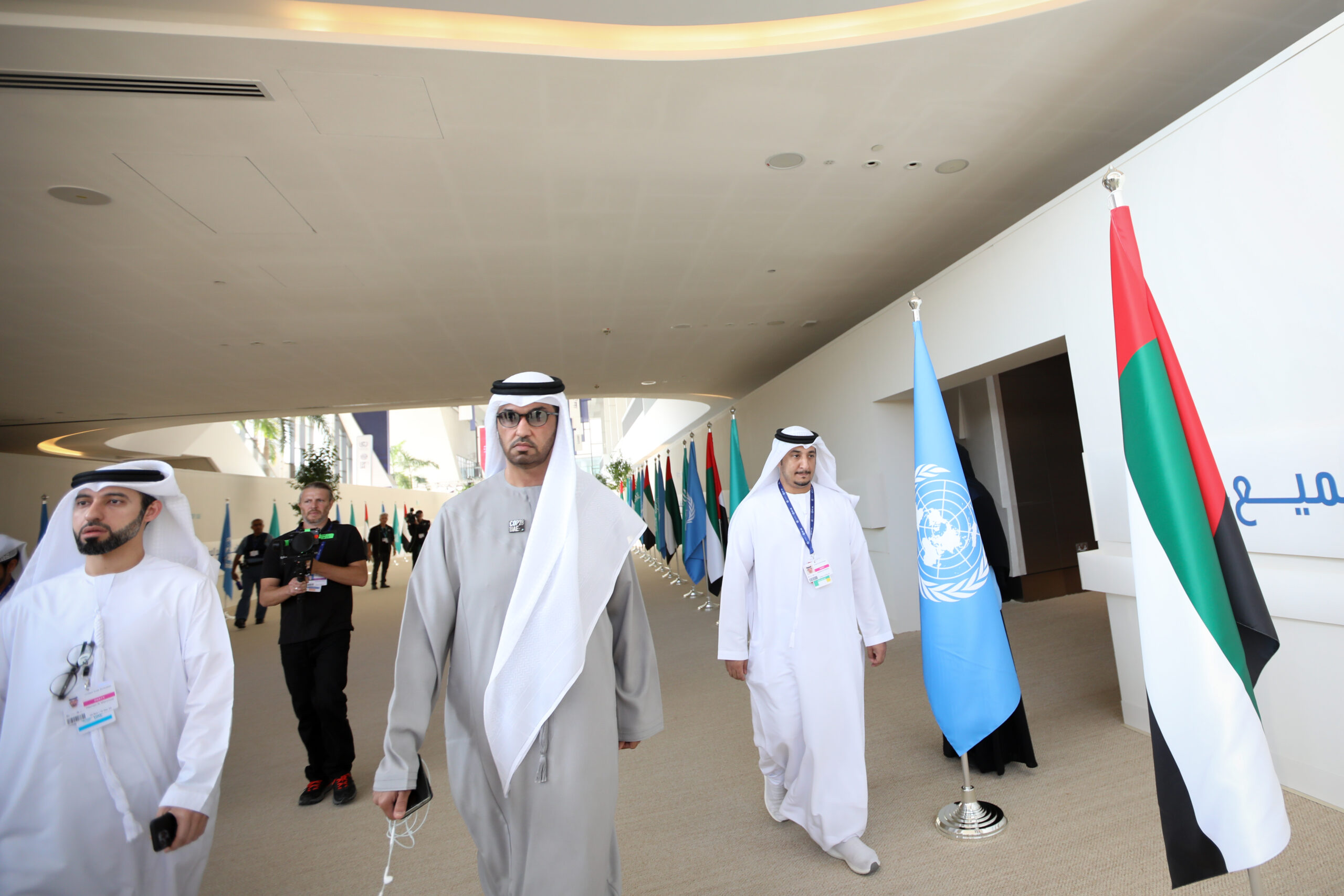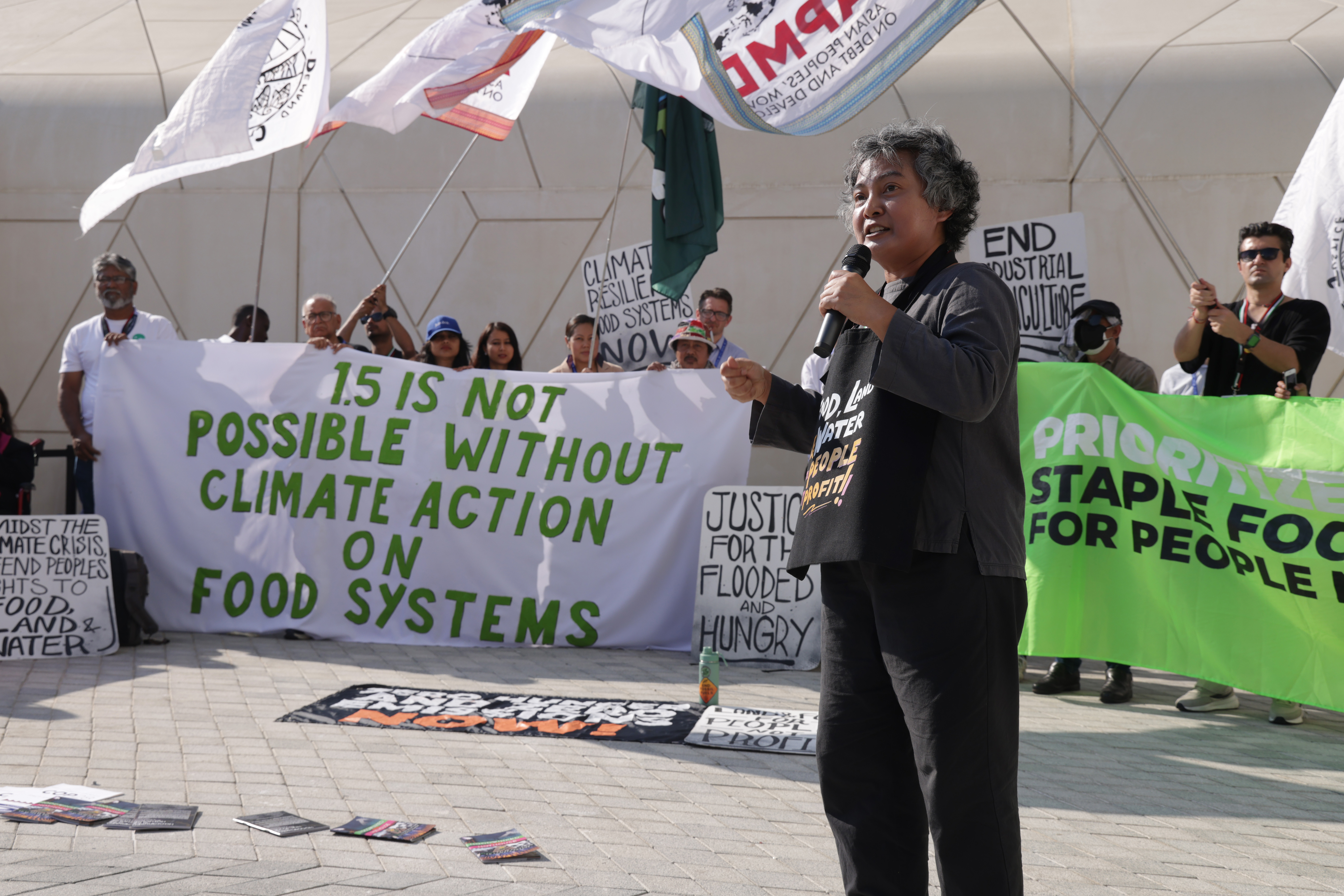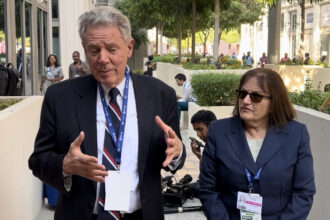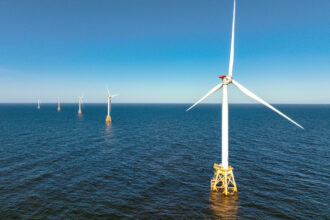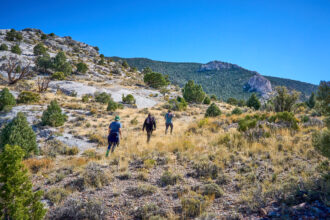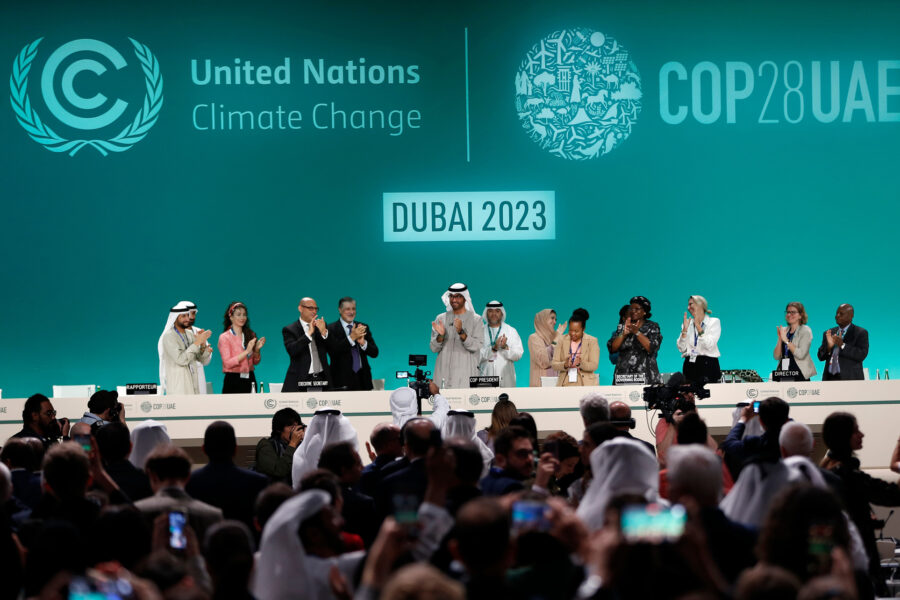DUBAI, United Arab Emirates—Going into overtime under the cover of a dark winter night in Dubai, climate negotiators at COP28 cooked up a weak sauce of climate half-measures that fail to adequately address the existential risk of global warming to millions of people around the globe, according to leading climate experts at the conference.
The UAE Consensus, COP28 president Sultan al-Jaber said, represents a clear step in a just transition away from fossil fuels, but the tarnished image of the United Nations Framework Convention on Climate Change, and its process requiring consensus among nations, took another big hit because 39 small island states most affected by global warming were not in the room when al-Jaber signaled acceptance during the closing plenary.
As a result, there will be an asterisk next to COP28 in the future. To activists and many country delegates, the way the outcome came about further undermined al-Jaber’s leadership, which had been questioned since it was announced last year due to his apparent conflict of interest as head of the Abu Dhabi National Oil Company, one of the biggest fossil fuel producers in the world.
The conference started Nov. 30 with a growing coalition of countries calling for a fossil fuel phase out, and earlier drafts of the decision documents all included some iteration of that language, raising hopes that the UNFCCC would face the heart of the problem head-on.
But the finalized text calls only for accelerating efforts to “phase down” the use of unabated coal power, to “[transition] away from fossil fuels in energy systems, in a just, orderly and equitable manner,” and to accelerate action toward that transition “in this critical decade.”
Some of the speakers at the closing plenary, including Special Presidential Envoy for Climate John Kerry, said the mere mention of moving away from fossil fuels could be interpreted as a successful outcome for the climate summit. Al-Jaber tooted his own horn during the closing plenary by saying, “We have delivered a robust action plan to keep 1.5 in reach.”
That reference to the Paris accord’s goal of limiting warming to 1.5 degrees Celsius over pre-industrial levels elicited an immediate response from some climate scientists, including Rob Larter, a polar researcher with the British Antarctic Survey.
“When you see statements like this you know you’re being lied to,” Larter wrote in a social media post. “What’s been agreed certainly does not keep 1.5C in reach.”
Larter was one of the first scientists to highlight the abrupt and alarming decline of Antarctic sea ice this year. The vast expanses of ice at the poles function as one of the planet’s main cooling systems by reflecting a lot of incoming solar energy back into space. A permanent reduction of that surface would lead to additional heating of the atmosphere.
Other scientists at COP28 warned that the current level of warming, set to come close to 1.5 degrees Celsius this year, is already driving parts of the planet’s climate system toward irreversible tipping points.
The statement about a transition away from fossil-fuels remains too vague, “with no hard and accountable boundaries for 2030, 2040 and 2050,” said Johan Rockström, co-director of the Potsdam Institute for Climate Impact Research.
He faulted the statement for ignoring that carbon dioxide removal technologies will need to be scaled up massively to meet the 1.5 degree Celsius goal, and said there is still no convincing plan on how the transition away from fossil fuels will occur.
“We know it will not happen through national voluntary means alone. Collective, global agreements, on finance, carbon pricing, and technology exchange, are also needed, at a scale that vastly exceeds what is now on the table,” he said.
The new COP28 agreement also calls for “accelerating and substantially reducing non-carbon-dioxide emissions globally, including in particular methane emissions by 2030,” and for speeding the reduction of emissions from road transport, as well as “phasing out inefficient fossil fuel subsidies that do not address energy poverty or just transitions, as soon as possible.”
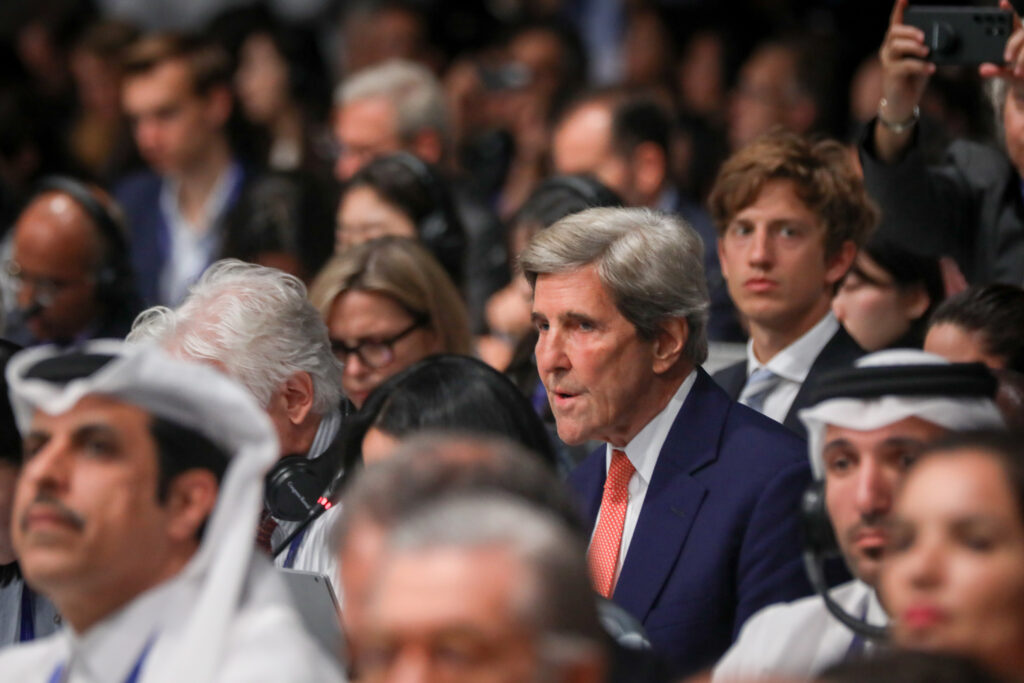
Kerry said the document should be seen as a significant achievement, given the challenge of trying to win consensus among 200 parties. “For the first time in the history of our regime, the decision supported by all nations of the world calls for transitioning away from fossil fuels in energy systems, so as to achieve net zero by 2050,” Kerry said.
“That is clear,” he said, even if it is not as strong as many would have liked.
Kerry said the applause that rang out in the plenary for the small island state representatives was “a clarion call to all of us about our obligation and responsibility over these next months to make sure we’re reaching as far as we can to implement as fast as we can.”
Consensus, or Not?
The Alliance of Small Island States addressed its absence during the decision-making phase of the final plenary directly.
“We are a little confused about what just happened,” the delegate from Samoa said on behalf of AOSIS. “It seems that you gavelled the decisions, and the small island developing states were not in the room. We were working hard to coordinate the 39 small island developing states that are disproportionately affected by climate change, and so were delayed in coming here.”
The agreement falls far short of what would be needed to prevent some island states from being swamped by rising seas by the end of the century, AOSIS wrote, referring to it as a “draft decision,” which implies that the group doesn’t consider the document finalized.
“The course correction that is needed has not yet been secured,” the AOSIS statement continues. “We have made an incremental advancement over business as usual when what we really needed is an exponential step-change in our actions and support … We do not see any commitment or even an invitation for Parties to peak emissions by 2025.”
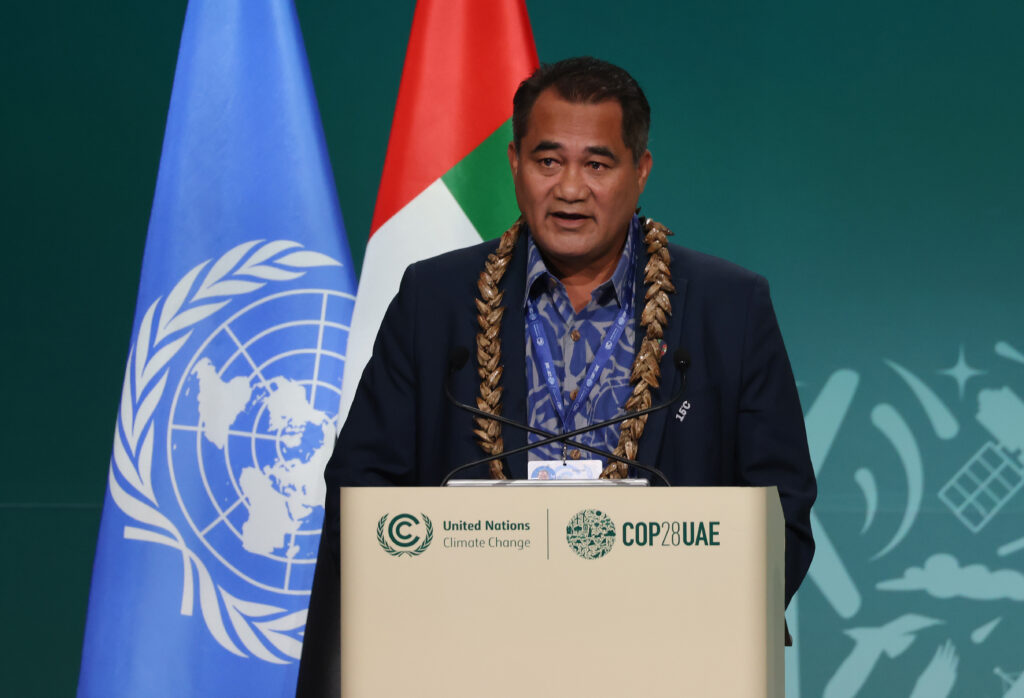
Although the decision frequently refers to science showing that fossil fuels must be phased out, the agreement doesn’t include a path toward the needed actions, the island states said.
“It is not enough for us to reference the science and then make agreements that ignore what the science is telling us we need to do,” the group wrote.
“I think AOSIS wanted to highlight that this decision could not be seen as being adopted in their name,” said Sébastien Duyck, a senior attorney with the Center for International Environmental Law. “The outcome is not enough to protect their sovereign rights, human rights of future generations.”
That, he said, could be important in an international legal context, with the International Court of Justice preparing to look at the responsibility of states in the context of climate change.
“A Leaky Canoe”
Statements from other countries during the closing plenary showed that the consensus touted by al-Jaber is fragile, and was reached mainly to avoid the appearance of a disappointing failure.
The German delegate said there were tears in the room, but that they were not all tears of joy, and spoke directly to island states: “Samoa, Marshall Islands, we see you, we feel you, we know this might not be enough.”
Some oil producing countries from the Arab League said the new agreement veered too far off the Paris Agreement by ignoring the principle of national self-determination, by mentioning a timeline, however vague, for the energy transition, and by shifting the conversation away from emissions to the source of emissions.
COP28 followed a now-familiar pattern: Heads of state, heads of governments and ministers flying in on private jets at the beginning of the talks—in the case of the United Kingdom, three high-level representatives all arriving on separate private jets—and making flashy announcements about scientifically unfounded non-binding deals.
One example is the voluntary methane reduction deal touted as a short-term silver bullet against global warming; recent research suggests that warming has already started to unleash massive methane releases from natural sources that will render insignificant any efforts to cut methane from oil and gas production.
The delegate from Colombia, the first major oil and gas producing country to join the push for a fossil fuel non-proliferation treaty, quoted her country’s president, Gustavo Petro, who said the showdown at COP28 represents “a struggle between fossil capitalism and life.” She warned that the agreement includes numerous loopholes that could lock developing countries into decades of continued fossil fuel consumption.
This story is funded by readers like you.
Our nonprofit newsroom provides award-winning climate coverage free of charge and advertising. We rely on donations from readers like you to keep going. Please donate now to support our work.
Donate NowRepresentatives for Indigenous communities and civil society environmental groups said the agreement doesn’t go nearly far enough to ensure the fossil fuel phase out science demands, or toward ensuring climate justice for developing countries.
Missing is language to ensure that rich nations go first and fast to end their fossil fuel addiction, and the groups pointed out that planned oil and gas developments in just a handful of rich, developed countries are enough to “bust the goal of 1.5 degrees.”
The outcome perpetuates a 500-year legacy of colonialism and will lead to more inequality in the future by continuing to encourage the commodification of nature, the Indigenous representatives said. And even though the final documents recognize the role of Indigenous people as the guardians of Mother Earth, “Our rights and knowledge continue to be sidelined in these discussions,” an Indigenous representative said.
The head of the Marshall Islands delegation, John Silk, called the outcome dishonest.
“I came from my home islands to work with you to solve the greatest challenge of our generations, to build a canoe together for my country …” he said. “We have built a canoe with a weak and leaky hull. Yet we have to put it into the water because we have no other option,” he said.
“I appreciate the effort that has gone into this outcome, but it has not been inclusive,” he said. “The fact that the decision was gavelled without a major group in the room … is unacceptable … This is a small step in the right direction in this process, a good signal. But in the context of the real world, where temperatures are rising and people are dying, it is not enough. And so as we sail this leaky canoe together, let’s agree to patch the holes so we can keep the canoe afloat for the sake of all of us, especially the most vulnerable.”
Marianne Lavelle contributed reporting.

